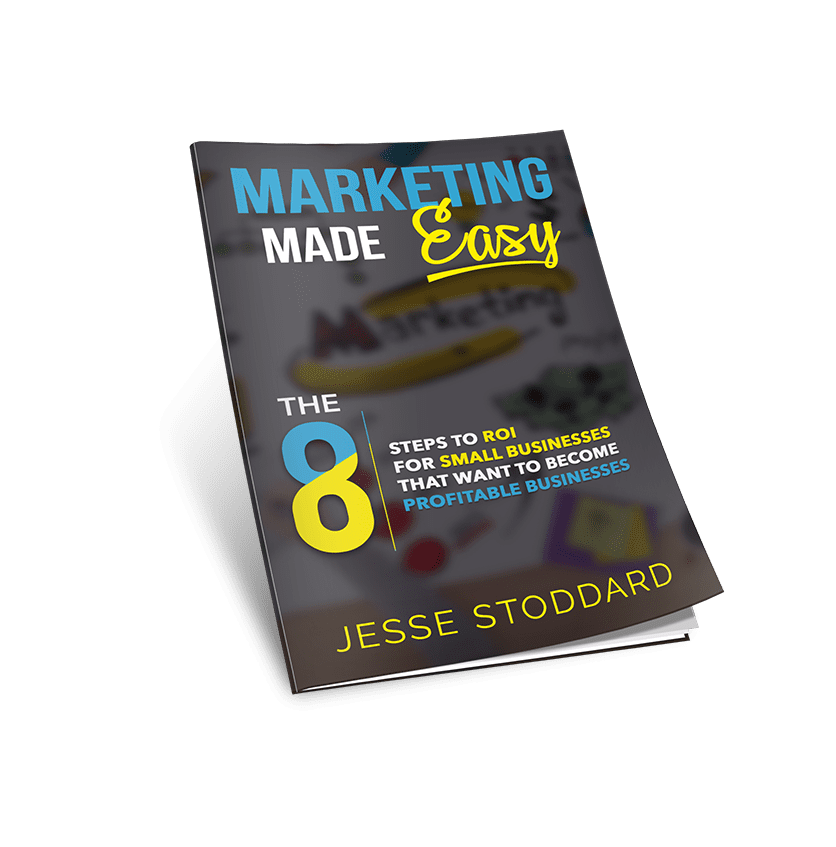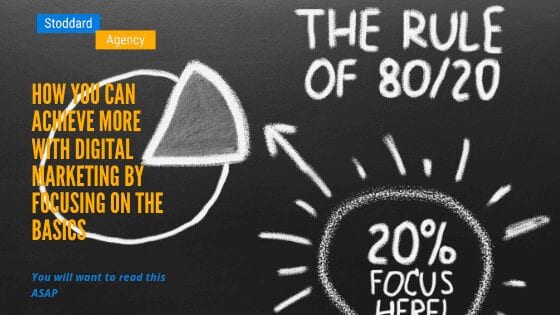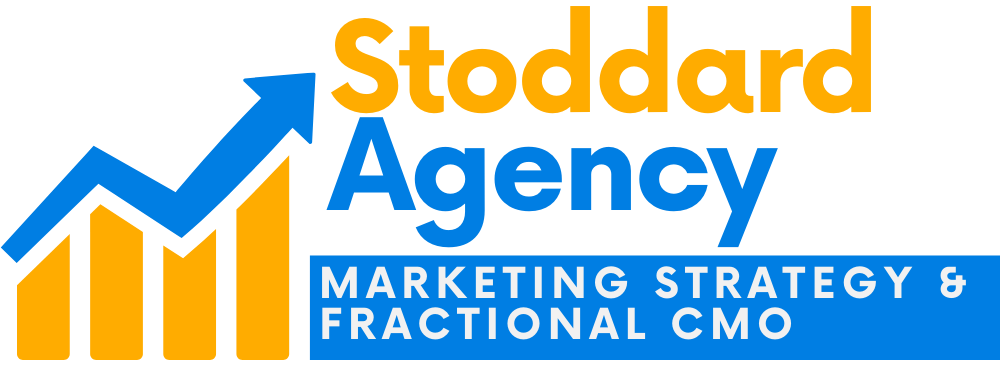If you are a small business just starting out, or if you’ve been at it a while and seeing diminishing returns, following the 80/20 Principle for your digital marketing will increase the likelihood of getting the results that you hope for, and it might even surprise you.

Hey everybody, it’s Jesse Stoddard here with the Stoddard Agency. I wanted to jump on here and share some awesome insights that I had recently working with clients. By reading the 80/20 principle, a book by Richard Koch and 80/20 Sales & Marketing with Perry Marshall and Richard Koch. This is probably the third time I’ve read, I listened to the audio version several times and many of his other books – they’re all excellent by the way. So the point is this:
- 80% of what you get, 80% of the profits, 80% of your customers, 80% of the effects are going to come from 20% of the causes
- 20% of the inputs are going to result in 80% of the outputs
- 20% of the customers are going to get you 80% of your profits
- 20% of your products produce 80% of your profits
Fascinating idea. It’s not so much about the number, it’s more about the idea that there’s an imbalance. So it might be 95/5, it might be 70/30. It might be, it’s some other percentage, but it’s almost never 50/ 50, anywhere even close to 50/50, which is what we intuitively think. So now how does that apply to business?
I’ve got a story for you recently. We set up a new attorney, just got them their first client, using some basic marketing principles. I started looking at the rest of our clients and thinking, they’re trying all these different things people try online marketing, offline marketing, TV, radio, SEO, Google, Facebook, Pay Per Click, listings, reviews, social Media, bus signs, shopping cart, signs, mailers, every door, direct mail versus, first-class mail versus FedEx. checking all boxes, all these different things and they’re all great.
I’ve talked about this a lot in the past where you’re doing them all creates diversification in a good way that can compound and create omnipresence for you, after knowing who your ideal target market is, who are 20% of clients, where you can be everywhere to them. But for the average business just starting out, there’s typically an 80/20 when you’re getting going and you’re trying to develop a little bit better result. Maybe you’re a small law firm for example, as well. We got these guys started and everybody’s asking me questions about what about this fancy, we need a fancy website. It’s really amazing and beautiful. We need to be doing, do we, do we need to do direct mail? Do we need to do all these different things?
Should we do Facebook ads? Should we do Google ads? What are we going to do? It’s really surprising when I look at all my clients and clients that I worked with before I had my own agency and also working in corporate America, for a big company doing all their marketing as Chief Marketing Officer. I look at all of it and it’s kind of sad in a way because of all the time that people put in and money that they invest. You can get a huge bang for your buck just doing some really basic things. This actually hurts my business because I do the higher end stuff as well. You know, the Facebook ads and the social media and the complex stuff. Now there’s an 80/20 within that too. But let’s get to the point, the things that make the biggest difference right now.

Inside this Comprehensive Guide, You’ll Learn…
- How to Avoid the Most Common Small Business Marketing Mistakes
- How to Test Your Ideas Before You Waste Another Dollar
- How to Create a Quick and Easy Marketing Plan
- How to Decide What Advertising Media to Use
- How to Develop Advertising Assets That Give You Ultimate Leverage and Reliable Profits
This could all change in a couple of years, but right now the biggest differences are if you’re a local business and you’re trying to show up somewhere, you want to make sure you show up when someone’s looking for what you do. So for example, bankruptcy attorney, the biggest bang for your buck is actually having bankruptcy as the main thing that you’re advertising and what you’re doing it online, digitally. Not offline. Referrals, of course, are always better. But you know, once you get past that or when you get to more people to get referrals from, the 80/20, it’s going to be digital marketing. It’s going to be Google My Business, GMB. That’s your number one place you need to show up with the proper name, address, and phone number. You have to have a decent website, not necessarily the best one, but a good balance website.
That’s easy. It has great contact information, easy to find on and on the home page, your name, address, phone number, and a contact form. All that’s really easy to find the websites relatively fast and the SEO and it has these, the words that you’re trying to target and if you do that, plus you have Google and then there are a few other things that I consider in the 20% right now I’m actually doing the 95/5. If you just do those by the way, and then you have some decent reviews on Google, you’re going to probably produce 80% of your results as a local business, especially when you’re getting started or when you’re smaller. It gets more complicated a little bit, but those are the small hinges that move big doors. That’s the leverage points.
Now we want to branch out a little bit more past the 95 five more to the 80/20 the rest of the 20% are still fundamentals. You’ve got a decent website that’s relatively fast, is relevant information on it that is easily organized. Good user experiences. It doesn’t have to be top of the line $10,000 website either. I mean this could be a $1,500 website or 5,000 or even a $500 website if you do the work yourself even. Then the next thing you have to have is your listings in order. That’s your name, address and phone number everywhere appears across the Internet, especially on the big players like Google. But even like, let’s say you’re in law, again, the story out of my bankruptcy attorneys, I basically are making sure that they’re on all the major, law listing sites and all the major, data aggregators so that across the Internet the name, address, phone number is correct, accurate and it shows up consistently pointing to the website.
That’s going to get you shown on Google more than almost any other SEO trick you can do. Everybody’s always trying to take shortcuts and find these little things, these little tricks. But the basics, a lot of times people do tricks, spent a lot of money on this stuff when they haven’t gotten the basics down. Right? Then finally reviews so that your reputation, it looks good. Also what happens on social media can affect that. But primarily Google my business and Facebook are the biggest places you’re going to want your reviews for almost every single local business. You might throw Yelp in there as a runner up and then other, industry-specific sites like law websites maybe, but they’re not the primary ones. So there you go. Those are the 80/20, those are the 20% that are going to 80% of those initial results at least.
If you need help dial in that stuff in, then go to https://stoddardagency.com, we can help you with that. That’s what we do for small business, small and local business, especially most of my clients right now that we’re really good at are real estate managing brokers with sales teams, developing leads for them, dentistry and law especially. We did personal injury and we’re doing a lot of bankruptcy now. So those are some tips for you. I hope that made you rethink, look at your 80% and 20% ratios. Where are you getting the biggest bang for your buck? What are the little hinges that move the big doors? What’s your lever and fulcrum that is really going to move your business forward? Think 80/20 and that’s going to help. All right, take care. Have a good day guys. See you next time.





